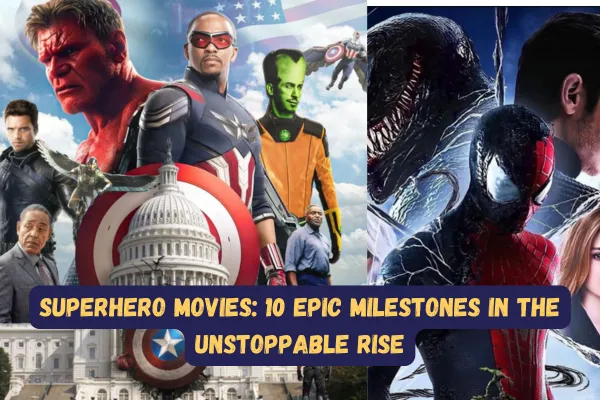
Contents
- 1 Introduction
- 1.1 1. Early Years of Superhero Movies (1960s-1980s)
- 1.2 2.The Dark Knight Era of Superhero Movies (1989-1997)
- 1.3 3.The Comic Book Revival (2000-2008)
- 1.4 4.The Marvel Cinematic Universe of superhero movies (2008-Present)
- 1.5 5.Impact and Legacy
- 1.6 6.The Future of Superhero Movies
- 1.7 7.Key Milestones in Superhero Movies
- 1.8 8.Notable Mentions in Superhero Movies
- 1.9 9.Future of Superhero Movies:
- 1.10 10.The Rise of the Cinematic Universe
- 1.11 11.Diversity and Representation
- 1.12 12.New Platforms and Distribution Models
- 1.13 14.Evolving Themes and Genres
- 2 16.Here are some frequently asked questions (FAQs)
Introduction
1. Early Years of Superhero Movies (1960s-1980s)
2.The Dark Knight Era of Superhero Movies (1989-1997)
3.The Comic Book Revival (2000-2008)
4.The Marvel Cinematic Universe of superhero movies (2008-Present)
5.Impact and Legacy
6.The Future of Superhero Movies
As we look to the future, the superhero genre shows no signs of slowing down. With more characters, story arcs, and spin-offs in development, fans can expect a wide variety of superhero stories in the coming years. From the multiverse concept to new heroes and villains, the possibilities are endless.
Superhero movies have come a long way from their humble beginnings, evolving into a dominant and diverse force in cinema. Whether you prefer the epic battles of the MCU or the darker tone of DC, there’s a superhero movie for every taste. As this genre continues to evolve, one thing remains constant: the enduring appeal of heroes who inspire us to believe in the extraordinary.
So, grab your popcorn, put on your favorite superhero t-shirt, and get ready for the next exciting chapter in the ever-evolving world of superhero movies!
7.Key Milestones in Superhero Movies
-
1966: “Batman” (Adam West)
-
1978: “Superman” (Christopher Reeve)
-
1989: “Batman” (Michael Keaton)
-
2000: “X-Men”
-
2002: “Spider-Man”
-
2008: “Iron Man” (MCU begins)
-
2012: “The Avengers”
-
2014: “Guardians of the Galaxy”
-
2018: “Black Panther”
-
2019: “Captain Marvel”
8.Notable Mentions in Superhero Movies
-
“Blade” (1998): First successful comic book movie
-
“Hellboy” (2004): Cult classic
-
“The Incredibles” (2004): Animated superhero film
-
“Watchmen” (2009): Deconstruction of the genre
-
“Logan” (2017): Critical acclaim and awards
9.Future of Superhero Movies:
-
Expanding universes (DC, Sony, Marvel)
-
Increased diversity and representation
-
New platforms (streaming, TV)
-
Evolving themes and genres (horror, comedy)
10.The Rise of the Cinematic Universe
11.Diversity and Representation
12.New Platforms and Distribution Models
14.Evolving Themes and Genres
16.Here are some frequently asked questions (FAQs)
A: The first superhero movie was “Batman” (1966), a film adaptation of the popular TV series starring Adam West.
A: The success of “X-Men” (2000) and “Spider-Man” (2002) paved the way for the modern superhero movie era.
A: The MCU is a series of interconnected superhero films produced by Marvel Studios, starting with “Iron Man” (2008) and culminating in “Avengers: Endgame” (2019).
A: The DCEU is a series of interconnected superhero films based on DC Comics characters, starting with “Man of Steel” (2013) and including films like “Batman v Superman: Dawn of Justice” (2016) and “Wonder Woman” (2017).
A: Superhero movies have had a significant impact on popular culture, inspiring countless fans worldwide and influencing other forms of media, such as TV shows and video games.
A: The future of superhero movies looks bright, with expanding universes, increased diversity and representation, new platforms and distribution models, and evolving themes and genres.
A: Some notable superhero movies that have received critical acclaim include “The Dark Knight” (2008), “Logan” (2017), “Black Panther” (2018), and “Joker” (2019).
A: Superhero movies have had a significant impact on the comic book industry, with many storylines and characters being adapted for the big screen and vice versa.
